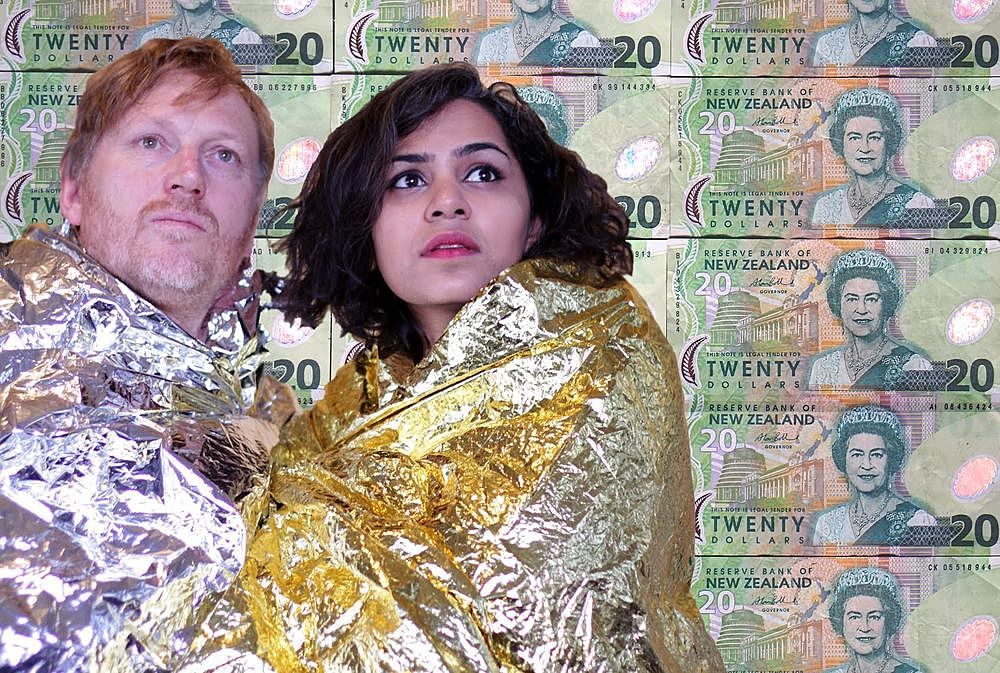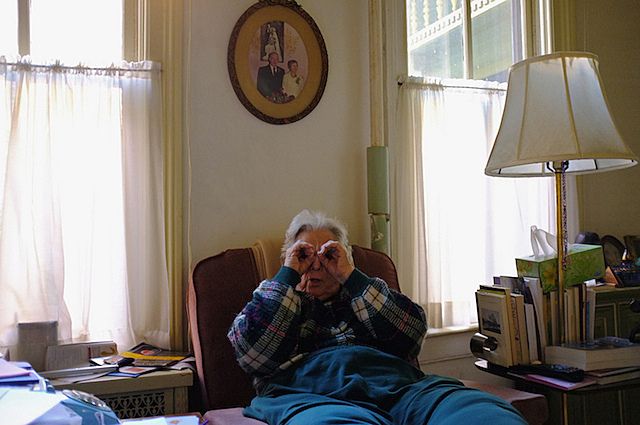Review: Free Happiness
Free Happiness: is it a promise, a marketing ploy, or a critical intervention in our everyday psychology?
As you enter the doors to Free Happiness, your $20 ticket is exchanged for a roll of dollar coins to the same value, a plastic money bag, and a single one-dollar coin. This is the opening gambit to the show: everyone who attends makes an immediate 5% return on the cost of admission. You could choose to go the whole show without spending any of that money. Free money, and - if you want - a free show, but first you have to buy in. You have to invest to earn. You don't get that extra dollar if you don't spend that first twenty, and so just like that, before you've even entered the theatre, the psychology of speculation gains a foothold in your mind.
The Basement Studio is set-up like a bright, off-kilter rec-room, with a ping pong table, fake grass and a space to sprout an array of seeds. With that bag of money in your hands, you're primed to think about how you might spend it. Tactical discussions spring up between people in the room. Is it better to spend freely or hoard your cash against the next, possibly better experience? Should you try all the free activities on offer because they’re free? Should you speculate on the Chair Market (a place where chairs are bought and traded) by holding out for a better price, or investing in extra chairs with the expectation that they’re scarce resources in a bull market? All this in the first five minutes as people are still filing through the door.
Before you've even entered the theatre, the psychology of speculation gains a foothold in your mind.
Free Happiness by Future Hotel (Nisha Madhan and Stephen Bain) is part theatre, part education, part ‘free’ market economy, part social-experiment and all of it entirely quantified. Everything was counted. There were 41 of us who entered the room, and we were soon told that nine of us had already played free table tennis, while seven had planted free seeds. According to the numbers, only one of us had drawn a picture, another activity we could participate in for free. Twenty of us, or 49%, had not taken up any of the free activities on offer. This was just the beginning of the counting. Our audience numbers were run against Creative New Zealand’s metric for audience typology - the greater percentage of us were arbitrarily deemed ‘Cautious Gamblers’, aware of the benefits of art and open to controlled risk. Our answers to their questions were logged throughout the night, and each time we spent and trade, our transactions were recorded and reported.
In a slightly warped hall-of-mirrors kind of way, the show reflects our current era of financialised capitalism. Services and experiences are gifted and sold, future options are offered, and game-show opportunities arise so you can win your way into (comparative) wealth. It’s a show that creates the experience – and implications – of money. The $21 in our bags become seen in terms of its value elsewhere: in the cost of putting the show on, and – through physical props – the scales of the world economy and the omnipresence of debt. But it's steers clear of becoming a dry economics 101 lecture and remains a fast and funny romp through complicated concepts.
It's something that Future Hotel do particularly well: politically and socially-sharp explorations of the ridiculous - sometimes even the cathartically ludicrous - in ways that dissolve the artificial boundary between audience and performer, reconstructing that relationship into something more free-form. With Free Happiness, they play with roles like the salesperson, the workshop leader and the game show host to incite you into actions (and revelations) that sit outside the boundaries of social normalcy - and they do it in a way that doesn't expose you to ridicule or later regret (although at least one participant regretted their participation in the collective throwing of their $1 contributions irretrievably down the drain - for ecological reasons).
Very late in the 90-minute show, we're asked to call out what we still have in our coin bags. It ranges between $8 and $21. Totalled up and averaged, that’s $17.78 per person. Money has not trickled out or down.
At a certain point the focus shifts from an exploration of financial systems to a reflection on the speculative economy of the arts, and the specific economy of putting on the very show we're part of. We're subtly led into making a collaborative performance, and then invited to sign up as participants in a Creative New Zealand application to develop and re-perform the work next year. We're pitched two different versions of how Free Happiness might be developed and re-shown, and asked to invest in these shows by buying future options, chucking our money into one of the many buckets that are being used to collect our coin. Very late in the 90-minute show, we're asked to call out what we still have in our coin bags. It ranges between $8 and $21. Totalled up and averaged, that’s $17.78 per person. Money has not trickled out or down. The stats man puts this figure against the cost per person of putting on the show tonight - $28.58 - a cost which leaves them in a hole.
In the face of the demonstrated unprofitability of their labour, the failure of their entrepreneurialism, Nisha and Stephen take their final option: begging. They performatively abject themselves by removing their clothing and purposefully making their way through the audience, bucket in hand, never making eye-contact. We all rush to empty our bags of the money we’d cautiously held back. Perhaps we’d always intended to walk out of there without the money we came with. But why wait till this moment? Why make them beg?
It's in that moment that the underlying structural violence of both the neoliberal economy and the ‘arts industry’ are most clearly demonstrated. Both systems demand that we speculatively invest in and exploit our bodies, minds and emotions; that we quantify and capitalise on the outcome of that investment inline with performance indicators; and that we do this within an unequal system where we are expected to feel grateful for the opportunity to work. Too frequently we resort to begging in an insecure environment: please like us, please employ us, please pay us or fund us, please finally reward us for our ongoing self-investment and entrepreneurialism.
In all of this, where was happiness? Don’t worry. That was calculated too. Over the course of the evening, our responses, participation, and learning experiences were added up to work out the room’s Gross National Happiness, an alternative unit of measure focused on broad measures of wellbeing, not circulation of capital. They told us we were deeply happy and we applauded enthusiastically - this declaration was our happy ending to the performance. But in the light of day, I'm left with a subtle sting: in an environment where econometrics is how value is measured, quantifying happiness seems normal. But in the end, it’s still a way of counting things.
Free Happinesswas at the Basement Theatre
2-6 August

